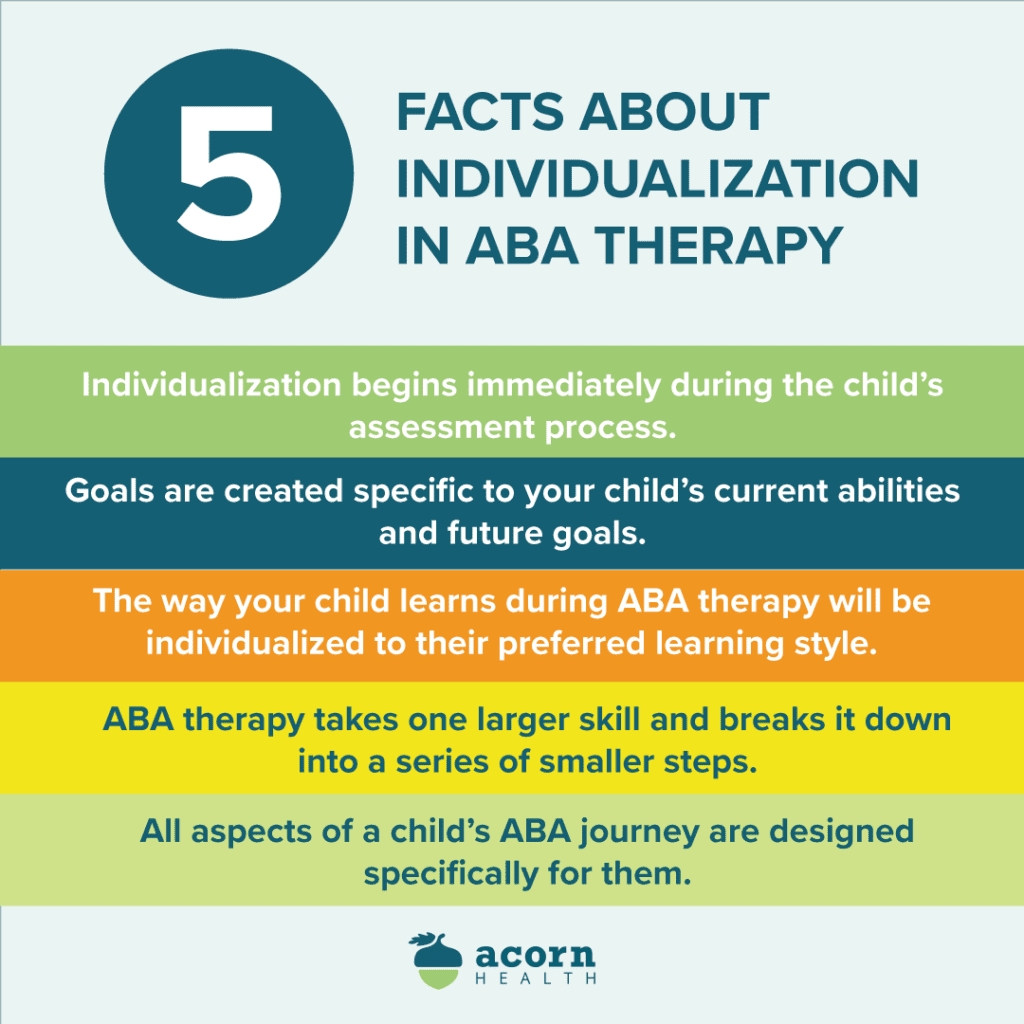Clinically reviewed by Paul Doher, BCBA, M.A., LBA, National Director of Clinical Quality

Applied Behavior Analysis (ABA) therapy is considered the gold standard treatment and therapy recommended for children with autism. It is highly individualized and tailored to meet the needs and goals of each client, while empowering a child’s unique strengths and personalities to shine through.
Here are five facts to know about the ways in which ABA therapy is unique to each child.
Individualization begins immediately during the child’s assessment process.
Before beginning ABA therapy, a child’s current level of functioning is measured through an assessment that includes multiple touchpoints to understand their unique abilities. The initial assessment includes an interview with a child’s caregivers. Through this interview, the team at Acorn Health obtains important information that helps us individualize treatment by catering to the learner, caregiver, and family needs. After the caregiver interview is completed, a client observation then takes place. Here, the clinician observes the learner interacting with their natural environment. Following the caregiver interview and client observation, a direct assessment occurs. During this time the clinician works with the learner to identify specific areas of strength and areas for growth. 
Goals are created specific to your child’s current abilities and future goals.
When a child officially enrolls in ABA, their therapy goals are designed based on their needs, which are identified during assessments, interviews and observations. These goals are measurable and time-bound, and are agreed upon between ABA therapy clinicians as well as caregivers. Goals are specifically measured and detail what the learner will do, to what proficiency, with whom, and how many times in order for them to be considered mastered.
The way your child learns during ABA therapy will be individualized to their preferred learning style.
All children (and adults, for that matter) have their own preferred way they learn best. In ABA therapy, that’s even more prominently true, and Board Certified Behavior Analysts (BCBAs) work to learn and understand each client’s preferred learning style. Examples of different teaching approaches used during ABA therapy include:
- An instructor who models a task for a child;
- An instructor who provides simple instructions for a task;
- A child who utilizes a computer to learn a specific skill.
ABA therapy takes one larger skill and breaks it down into a series of smaller steps that allow the child to learn in a structured, systematic fashion. There are multiple ways a BCBA can teach a child how to perform the same skill. BCBAs take time to understand the unique needs of each child in order to best tailor how they present information in a way that can best be absorbed.
Even a child’s ABA therapy schedule is individualized based on their needs. Some children may only require 10 hours per week of ABA therapy, especially if their goals are focused on a specific skill. Other children may need up to 40 hours per week in order to make progress toward their goals across multiple skills.
All aspects of a child’s ABA journey are designed specifically for them. We believe that our learners’ differences make them each special in their own way, and that through ABA therapy our exceptional clients can shine even brighter.
If you have more questions about the individualized approach of ABA therapy or would like to inquire about services for your child, please reach out to Acorn Health at 844-244-1818 or
https://acornhealth.com/admissions/.
–
Frequently Asked Questions
Other Commonly Asked Questions About Individualization in ABA Therapy:
Q: Does ABA therapy only focus on eliminating problem behaviors?
A: ABA therapy focuses on eliminating problem behaviors and teaching new skills. We have seen that once interfering behavior and barriers to learning are addressed and overcome, therapy may focus more on skill building.
Q: How does ABA therapy promote confidence?
A: An incredible aspect of ABA therapy is that once a learner develops certain communication skills, we can see their own unique personality shine through. Their confidence and abilities empower them to feel confident in who they are.
If you are interested in learning if Acorn Health is the right place for your child to begin their ABA therapy journey, call us to schedule a free consultation at 844-244-1818.